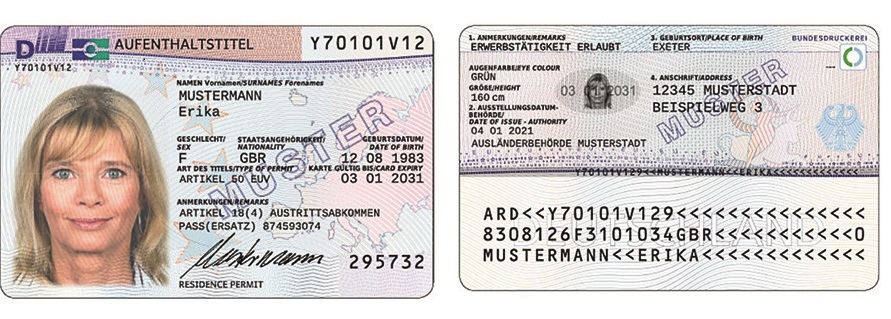The withdrawal of the United Kingdom from the European Union affects the right of residence of UK nationals and their family members in Germany.
With the following information, we try to answer as clearly and concisely as possible the most important questions that apply in the majority of cases. For situations concerning individual cases, please make an apointment with our Immigration Experts.
The following questions only deal with the effects of the United Kingdom’s withdrawal from the European Union on your residence in Germany.
Other questions relating to the withdrawal, particularly concerning social insurance, including pension claims or the recognition of professional qualifications, are not covered here. Please contact the competent bodies concerning these questions, for example the social insurance institutions concerning social insurance-related matters.
The Withdrawal Agreement provides for the following principle concerning rights of residence:
- Until 31 December 2020, the end of the transition period, rights of residence will be treated as if the United Kingdom were still an EU member state. Thus, during this period, there will be no change with regard to the rights of residence of UK nationals and their family members or their right to work in Germany.
- From 1 January 2021, persons who were entitled to live or work in Germany (or another EU member state) until that date and who also exercised that right will essentially have the same rights as they had before withdrawal. Provided these rights were exercised, they will be effectively frozen.
These rights exist by law, which means you can assert them without taking any further action. In order to be able to provide evidence that you have rights under the Withdrawal Agreement, however, you must have a document that you can obtain from the foreigners authority. You can find detailed information here.
- UK nationals living in Germany on 31 December 2020 and continuing to live in Germany after that date must report their residence to the foreigners authority responsible for their place of residence by 30 June 2021 in order to be able to obtain the new residence document.
If you are entitled under the Withdrawal Agreement, you will receive this document in "cheque card format". The card is valid for a minimum of five years and a maximum of ten years.

If upon application, you are certified as having a right of permanent residence, the word "Daueraufenthalt" (permanent residence) will be found on the second line on the back of the card, below "Erwerbstätigkeit erlaubt" (permitted to pursue an economic activity).
The document costs the same as a German identity card: EUR 37.00 for persons over the age of 24 and EUR 22.80 for younger holders. No fee is charged if you have previously been in possession of a permanent residence card. A residence card and a permanent residence card will become invalid on 1 January 2022 in any case if you no longer have the right of free movement, but only have a right of residence under the Withdrawal Agreement. Before they become invalid, they will therefore be exchanged for a new residence document.
What happens at the foreigners authority?
The foreigners authority checks your identity and issues the new residence document. You will require a valid passport; the original passport must be presented. You are also required to bring a biometric photograph with you. The new residence document will be made centrally at the Bundesdruckerei printing office, like passports or ID documents. So it will not be handed out to you right away at your first appointment with the foreigners authority.
The foreigners authority is entitled to check whether you fall under the Withdrawal Agreement. To this end, documents may be required providing clear evidence that you were living in Germany on 31 December 2020 and continue to do so, or that you used to live in Germany and have not been absent from Germany for too long and have therefore retained your rights. Tax statements, salary statements, bank statements, a certificate of student status and other documents which clearly indicate that you actually have, or had, a main ordinary residence in Germany constitute suitable evidence.
In individual cases, the foreigners authority may also check whether the other conditions for entitlement to freedom of movement have been met, in particular, whether you are pursuing an economic activity, are seeking work within the permitted period or with a prospect of success or have sufficient resources to support yourself even though you are not pursuing an economic activity or seeking work.
Your foreigners authority will inform you if you need to present any further evidence. You will not receive a sudden negative decision but will be told what you can do to assert your rights.